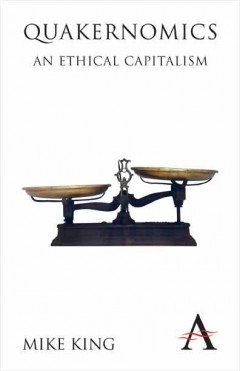Quakernomics
An Ethical Capitalism
By Mike King
Foreword by Sir Adrian Cadbury
Other Formats Available:
- About This Book
- Reviews
- Author Information
- Series
- Table of Contents
- Links
- Podcasts
About This Book
This book explores Quaker enterprises from 1700 to the twentieth century as examples of an ethical capitalism, and tests them against prominent economists and their concern for economic justice. King offers ‘Quakernomics’ as a model for corporate social responsibility in the modern world, exploring Quaker businesses which combine commercial success with philanthropy and social activism.
The volume offers an exploration of the theory and practice of Quaker enterprise through the centuries, set against the ideas of prominent economists such as Smith, Marx, Marshall, Schumpeter, the Austrian School, Keynes, Friedman, Krugman, Stiglitz and Sachs. It also analyses the role that Ayn Rand and Milton Friedman have had in leading to what King underlines as the largely unethical capitalism of today.
Covering the work of Quaker chocolatiers, iron masters and bankers, ‘Quakernomics’ presents a historical account of the Quakers’ practice of a ‘total capitalism’, which King argues we should regard not as an antiquated nicety but as an immediately relevant guide for today’s global economy.
Reviews
‘Fascinating, highly relevant and opportune, this book is a powerful exploration of history showing how ethical behaviour has been – and can be – an effective route to wealth creation and growth.’ —Carlota Perez, author of ‘Technological Revolutions and Financial Capital’ and Centennial Professor at the London School of Economics
‘“Quakernomics” presents a refreshing new way of thinking about economic activity, one which links the pursuit of profit with social justice.’ —David Vogel, Haas School of Business, University of California, Berkeley
Author Information
Mike King is an independent researcher and writer with wide-ranging expertise.
Series
Anthem Other Canon Economics
Table of Contents
Foreword by Sir Adrian Cadbury; Acknowledgements; Introduction; PART I: BACKGROUND; Chapter 1: Quakers and Commerce; Chapter 2: Industrial Capitalism; Chapter 3: Contrasting Cultures in 1845; PART II: THE QUAKER ENTERPRISES; Chapter 4: The Darbys of Coalbrookdale; Chapter 5: Quakers in Light and Heavy Industry; Chapter 6: Quakers in Science, Chemicals and Pharmaceuticals; Chapter 7: Quakers in Foodstuffs and Luxuries; Chapter 8: Quakers in Trading, Banking and Finance; Chapter 9: Quakers in Culture; Chapter 10: The Quaker System; ILLUSTRATIONS: QUAKER TRACES IN LONDON; PART III: QUAKERS, SOCIETY AND SOCIAL JUSTICE; Chapter 11: Quakers in Public Life; Chapter 12: Industrial Welfare and Quaker Lapses; Chapter 13: Quakers and Other Ethical Capitalists; PART IV: INDUSTRIAL ETHICS AND ECONOMIC THOUGHT; Chapter 14: From Mercantilism to Marshall; Chapter 15: Karl Marx; Chapter 16: George, Veblen and Schumpeter; Chapter 17: The Austrian School; Chapter 18: Keynes, Tawny and Galbraith; Chapter 19: Economics in Fiction; Chapter 20: Ayn Rand; Chapter 21: Milton Friedman; Chapter 22: Quakernomics and the Credit Crunch; Chapter 23: Quakernomics and Economic History; PART V: CONCLUSIONS; Chapter 24: Ethical Capitalism; Notes; Index
Links
Stay Updated
Information
Latest Tweets



